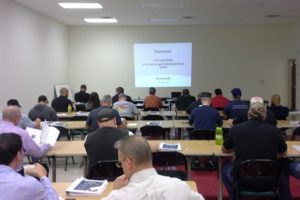Managing- it’s not the same thing as controlling. No one in the fourth quarter of 2019 said, “Oh, and let’s add a massive pandemic to the 2020 budget.”
On July 15th, IECC will be offering Project Management in the Time of Crises. Kirk Alter of Fast Management, Inc and Purdue University bring you a four week, eight hour, video class on the subject.

Here is a partial list from Kirk:
“Good project management has always required paying close attention to the skills of pre-planning, estimating, contract review, scheduling, project execution, customer control…and much more.
At all times, the fundamentals of good project management don’t change. In times of crises – these days of both health crises and economic crises, superior execution is critical to the success of all firms.
In these times “good enough,” isn’t, and many firms are at great risk in the coming months…and perhaps, years.
Contractor, industry expert, and Purdue University professor Kirk Alter and IEC Chesapeake are joining together to provide this timely series of 4-week programs for all-comers.
The class will be offered on Wednesdays from 5:00pm – 7:00pm Eastern, and will be delivered by WebEx. Materials will be provided via Drop Box. You can attend the using your computer, phone or other digital device.
This program is the first part of a series, so don’t miss it!
This is a real-world, case driven program designed to meet the immediate challenges to your firm resulting from the Covid-19 crisis, and the resulting economic crisis.
Topics and issues covered include, but are not limited to:
1. Safety: your customer has some project-specific revised safety policies, and your firm has revised safety SOPS, but the customer is not enforcing their own policies, and your craftworkers are grumbling, and resisting complying. What do you do?
2. Productivity: you know that enhanced safety precautions are negatively effecting field labor productivity. You understand that they’re necessary, but you’re having a difficult time quantifying the losses, and have no idea on how to convince your customer that these losses should be borne by the project owner. How do you calculate this?
3. Estimating – your firm is still pretty much estimating as you always have, and have not built de-rating for losses in productivity into your labor units. You’re afraid that if you do you won’t get the work, yet if you don’t, you won’t make the profits that you should. What changes do you need to make?
4. Proposals – throw your old proposal language out the window…you are not protected. Attend this class and learn how to appropriately cover your risk.
5. Contracts – you really need to understand how force majeure effects your projects, and revise your approach to contract negotiations and contract language. Identify, quantify, and qualify your contract language appropriately.
6. Schedule, delays, acceleration and completion – More than likely, any projects that have been delayed will be accelerated, with the owner and/or GC encouraging/forcing you to “pick up the slack” to help get the projects completed. Regardless of any contract language that you have signed you have leverage. Learn how to utilize that leverage.”
Watch this space for more from Kirk Alter regarding this class…
#managecrisisnottheotherwayaround
Jenny Boone, IECC, Business Development
#ifeelapivotcomingon













